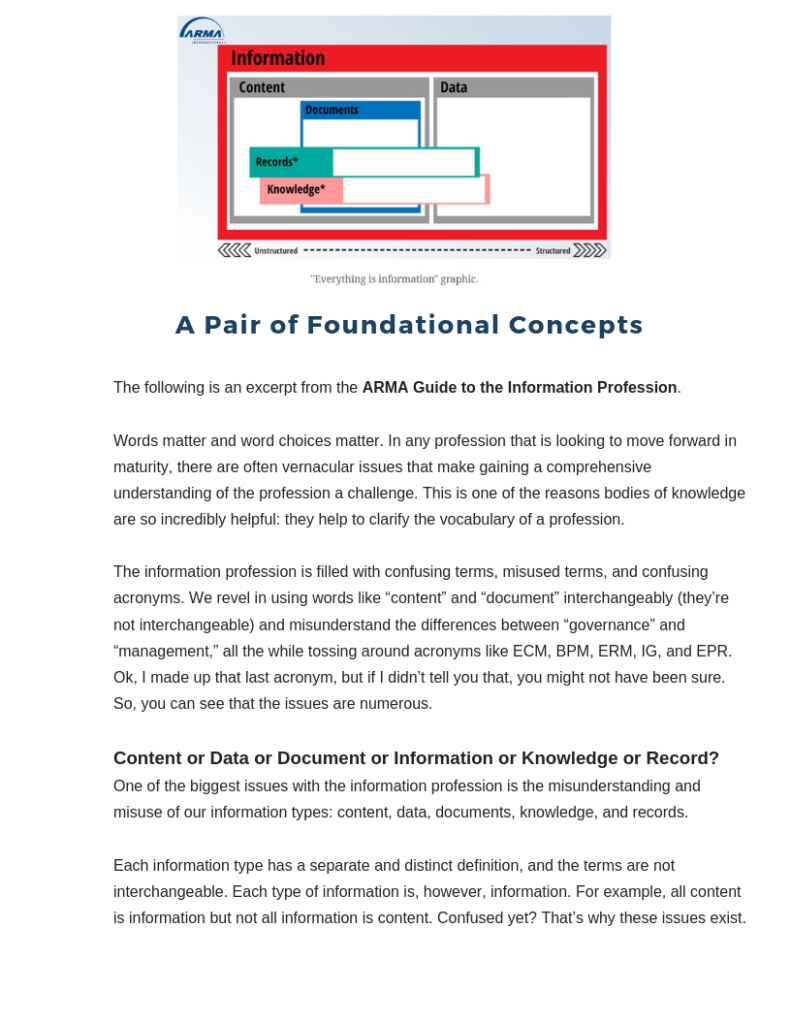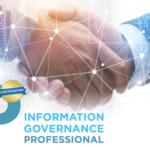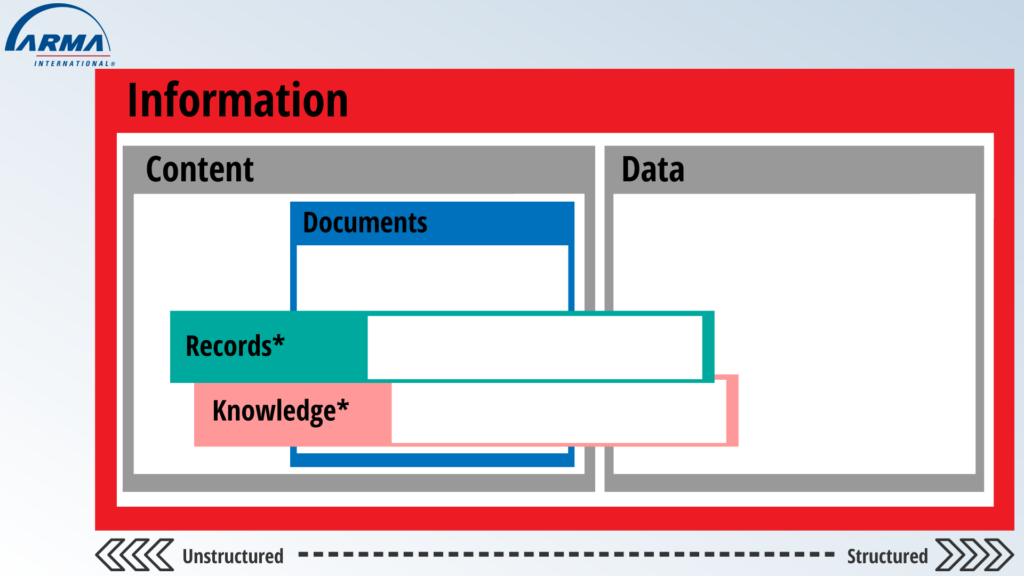A Pair of Foundational Concepts

The following is an excerpt from the ARMA Guide to the Information Profession.
Words matter and word choices matter. In any profession that is looking to move forward in maturity, there are often vernacular issues that make gaining a comprehensive understanding of the profession a challenge. This is one of the reasons bodies of knowledge are so incredibly helpful: they help to clarify the vocabulary of a profession.
The information profession is filled with confusing terms, misused terms, and confusing acronyms. We revel in using words like “content” and “document” interchangeably (they’re not interchangeable) and misunderstand the differences between “governance” and “management,” all the while tossing around acronyms like ECM, BPM, ERM, IG, and EPR. Ok, I made up that last acronym, but if I didn’t tell you that, you might not have been sure. So, you can see that the issues are numerous.
Content or Data or Document or Information or Knowledge or Record?
One of the biggest issues with the information profession is the misunderstanding and misuse of our information types: content, data, documents, knowledge, and records.
Each information type has a separate and distinct definition, and the terms are not interchangeable. Each type of information is, however, information. For example, all content is information but not all information is content. Confused yet? That’s why these issues exist.
Without a proper understanding of these terms, we cannot have a shared vocabulary across the information profession – this is the most important barrier that we remove in this effort. We believe that the easiest way to understand the differences between these terms is visually:
Everything, whether unstructured or structured (or even semi-structured), is information. Content is unstructured information while data is structured (this is easiest to understand through the structure of a database). Data tends to be relational while content tends not to be.
Documents are a type of content, semi-structured, through the use of a container (either paper or Word or PDF most commonly). Knowledge is a repurposable type of information that tends to include content more often than data. The goal of knowledge is for it to be shared between individuals within an organization (think of best practices resources). Records, like knowledge, can also be content or data and serve as evidence of a transaction or information that rises to the importance of being preserved.
Through this visual understanding, we know several things:
- Content is unstructured
- Documents are semi-structured
- Data is structured
- Knowledge can be found in any form
- Records can be found in any form
- All documents are content
- Not all content can be considered documents
- All documents are Information
- Not all information is documents
- All content is Information
- Not all information is content
- Content is not data
- Data is not content
- Everything is information
Governance, Strategy, & Management
We use terms like “governance,” “strategy,” and “management” after the words content, data, document, information, knowledge, and record, but we frequently use these terms improperly. For instance, records managers tend not to utilize a term such as “records governance” or “records strategy.” However, they likely should use these terms to describe the high-level planning, policy, and coordination that records managers do.
Governance and strategy are, for the information profession, interchangeable terms. For example, information governance and information strategy refer to the same work, whereas information management is different.
The terms “governance” or “strategy” should be used to describe high-level planning, policy, and coordination. Whereas the term “management” should be used to describe the tactical execution of said planning, policy, and coordination. The two sides must coexist.

Presented here are two foundational concepts included in the ARMA Guide to the Information Profession. Additional foundational concepts include “Records Management in Flux,” “Information Lifecycle,” “Capture, Digitization, Imaging, Native Creation, Scanning, & Upload,” “Information Assurance vs. Information Security,” and “Backup, Business Continuity, Disaster Recovery, and Information Assurance.”

View the PDF version of this article.
[ls_content_block id=”686″]
[ls_content_block id=”691″]
[ls_content_block id=”702″]
About the Author
- Nick Inglis is ARMA International's Executive Director of Content & Programming.
 Information Governance2022.07.18The IGP Exam: New and Improved
Information Governance2022.07.18The IGP Exam: New and Improved Analytics2021.02.01What’s Next in Information Governance? Continuous Audit and Analytics
Analytics2021.02.01What’s Next in Information Governance? Continuous Audit and Analytics Information Governance2020.11.19Information Governance: Alignment with Business is Essential
Information Governance2020.11.19Information Governance: Alignment with Business is Essential Information2020.09.11New Podcast Series Focuses on the Careers of Women Leaders in Information Governance
Information2020.09.11New Podcast Series Focuses on the Careers of Women Leaders in Information Governance

Frans Smit (member of ARMA)
Hi! Thank you for this post. Allow me some critical remarks, in order to help the debate further. I tend to disagree quite strongly on your use of the words and definitions.
At some stage in the post they I rather add to confusion then to give some clarification.
My opinion is that you get more effective definitions when a principled data-oriented definition of information is being used. In my view that is the mainstream way of thinking nowadays in information sciences.
When you use Floridi’s data-oriented approach for example, things (or: the foundations of what we deal with in our profession) fall into place much better.
See for an introduction for example https://plato.stanford.edu/entries/information-semantic/ .
I will try to summarize here.
An instance of information consists of of or more well-formed of meaningful data. This definition is irrespective of form (analogue, digital etc etc), just as the Dutch Archival Law describes so well. My definition of a record is that it consists of instances of information that are created or received during the course of a transaction (this is mainly derived from David Bearman). Creating a record is putting one or more instances of information into the context of that (business) transaction.
This is an inclusive definition of data, information and records.
So, “the data is all”. Information is putting data into context. Creating records is putting information into context.
Below some additional comments on words like “content” or “document”.
The word document can be one form in which an instance of information can be put (only one of them). I do not like the word document in daily use. Most people have a traditional, paper-based mindset towards that word.
Content is quite a difficult word to use. I would propose to put it equal to the data contained in an instance of information. Or to put it equal to all the data into a group of instances of information.
When you use definitions like this, you keep it much easier and much more clear what we talk about, according to me. It will enable for example the creation of standards, data models and desiging information systems in order to manage records.
I am happy to join a debate on this, since this is the very essence of what we are dealing with in our profession.
As a Dutchman I frequently use ARMA’s great work on Information Governance (truly the best). However the definitions used here, and the relationships between the concepts, might be given a second thought. If my suggestions are seen as a contribution to helping us further in overthinking the foundations of our profession, I would only be very happy!
Best wishes from Amsterdam, Frans Smit
Rebecca
Thank you for this article as we have been at this for years in trying to communicate this message to our organization.